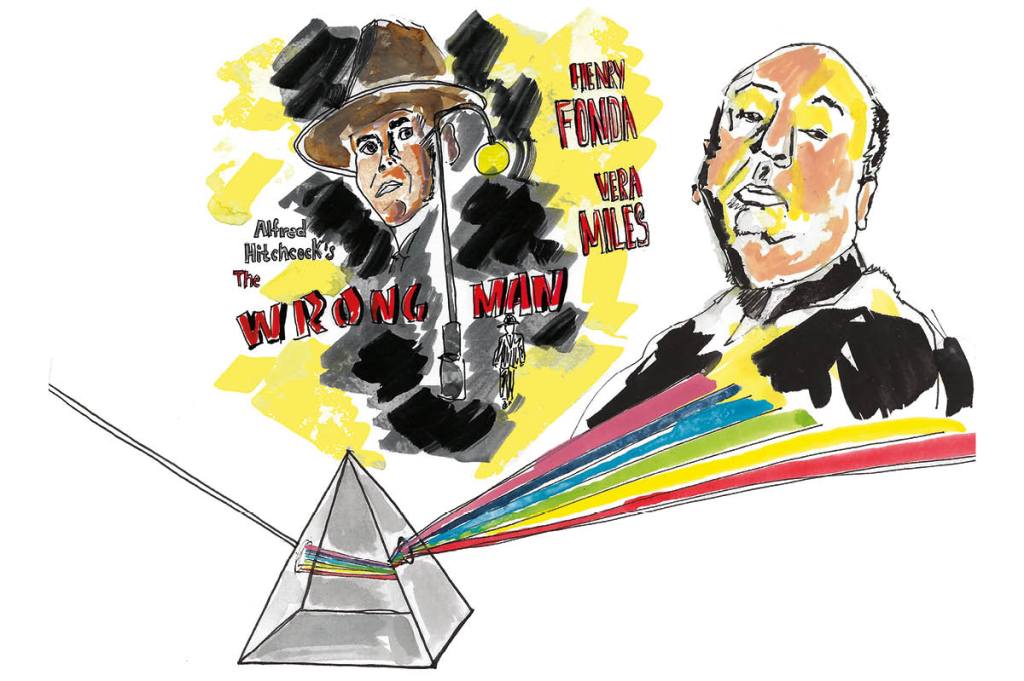Alfred Hitchcock: the master of suspense. We grew up seeing his entertaining thrillers on TV, beautifully made movies about elegant people in danger. The glamour of To Catch a Thief; Cary Grant as the wrong man on the run in North by Northwest; Tippi Hedren looking chic with her chignon, brutally attacked in The Birds by the titular avian menace.
Don’t look for heart, though. These were emotionally detached films, weren’t they? In his publicity Hitchcock joked about murder. He said that Psycho was a dark comedy. His TV programs were full of gallows humor. Critics said he had an ironic Englishness. Chilling and chilly.
Maybe it’s the Celt in me, but I don’t quite see the films like that. Yes, I spot the irony, and that’s part of their appeal. The films don’t preach. They don’t earnestly try to comment on society in the period — Forties, Fifties and Sixties — when they were made. But when I look at the Hitchcock movies now, in my fifties, forty years after I first saw them on TV in Belfast where I grew up, I don’t see icy detachment. Instead what strikes me is their intimacy, gentleness and even — a very un-Hitchcockian word — passion.
I started thinking about this during lockdown. Like many people’s, my emotions were closer to the surface in the Covid period. As we retreated into our homes, our harbors from which we could see the storm raging, a lot of people fell back upon comfortable cultural experiences. Streaming of classic films, for example, went up. I fell back on Hitchcock. To give my life some structure, I watched all fifty-three Hitchcock films in order.
I thought of this as a retreat, but actually it was an advance. As I watched the news from China, Italy, America, Mexico and anywhere where Covid hit hard, as I started to feel part of a single species globally under attack from a pathogen, I could feel my emotions come to the surface. I think I craved films, music and stories which reflected those emotions, and I believe I found them in the Hitchcock films. Covid was a prism, and prisms distort or refract, so I’ll tell you about my new, refracted Hitchcock.
One of his less well-known movies, The Wrong Man, grabbed me at once. Henry Fonda plays a struggling jazz musician whose life goes through the wringer when he’s misidentified as a robber. I’d seen the film before, and the “wrong man” theme is familiar to Hitchcock fans, but The Wrong Man is full of neorealist sincerity and piety. Fonda stares guiltily into a room where his kids are sleeping. His wife can’t bear the accusations, the mental pressures, and is hospitalized. Fonda’s character aches with love for her. They long for deliverance.
The Wrong Man (1956) is a Hitchcock outlier, but has Dostoevsky-level intensity. Jump back a few years to one of his lighter movies, the spy thriller Saboteur (1942) — the director’s first real film about America — and, although the genre has changed, there’s also a depiction of human fortitude. Again, a man is wrongly accused. He hitches up with a woman and, around forty-five minutes in, they jump onto a traveling circus caravan. There they meet a bearded woman, Siamese twins and other outsiders. The woman, Esmeralda, says, “It’s the good people that stick when anybody’s in trouble.” What seems at first to be a fast-paced road movie becomes something much more warmhearted, a story about solidarity and trust.
Start to look for these themes and they appear across Hitchcock’s career. Take Suspicion (1941), for example, in which Joan Fontaine plays a rich young woman who marries Cary Grant’s suave charmer. It’s very much about female desire. Fontaine’s character begins to doubt Grant’s love and worries that he might be scheming against her, and worse. The ending was famously softened (or spoiled) by the studio, but for most of the movie we are movingly taken into the labyrinth of the woman’s growing anxieties. At no point are we allowed to laugh at her. Suspicion is wholly protective of its protagonist’s emotions.
It was co-written by two women — Hitchcock’s longtime collaborator Joan Harrison and his editor and scriptwriter Alma Reville, who was also his wife. In the 1970s and afterwards, some feminists accused Hitchcock of misogyny, and there is no doubt that he behaved appallingly toward Tippi Hedren, the star of The Birds and Marnie. But many other feminists have pointed out how often Hitchcock worked with women behind and in front of the camera. There is no evidence that he treated other female actors the way he treated Hedren; I knew Janet Leigh and Teresa Wright and they both loved him, as did Carole Lombard, Ingrid Bergman and others.
Could it be, in fact, that the more rarely remarked-upon warmth in Hitchcock films comes in part from their femaleness? Think of the three movies he made with Ingrid Bergman. Spellbound (1945), his most Freudian film, in which she plays a caring, compromised psychiatrist, is flooded with love. Under Capricorn (1949) is a troubled, stylistically daring period movie full of compassion for Bergman’s character, an alcoholic.
And then there’s Notorious, one of the least detached, ironic American films of its time. It feels besotted, burnished, and is full of close-ups. Just a year after World War Two, Bergman is playing a German, a woman with a sexual past, who again drinks too much, and yet the movie adores her. The plot — Bergman is sent to Brazil as an agent to sniff out possible Nazi escapees, and sleep with them if necessary to glean secrets — sounds cynical, but the movie veers far from cynicism. It completely understands her despair and dedication. Light glints in her tears and, near the end, perhaps ours too. It’s the Hitchcock film most likely to make you cry as it contemplates the death of love and the sacrifices engendered by emotion. The lines “Oh you love me… you love me” are as romantic, as touching, as any of Bergman’s moments in Casablanca.
Suffering, tolerance, love, tragic romance — four ways of seeing unexpected intimacies and sincerities in the films of Alfred Hitchcock. And then there’s Rope (1948), which is sometimes dismissed as stagy or just a sort of technical exercise. Two young gay men kill a friend in a Nietzschean game. Their former teacher (played by Hitchcock regular James Stewart), who introduced them to supremacist ideas, slowly realizes what they have done. Appalled, he says to them, “Tonight you’ve made me ashamed of every concept I’ve ever had about superior or inferior beings. And I thank you for that shame.”
French critics were among the first to see moral seriousness in Hitchcock movies, and Rope is adapted from a play by Patrick Hamilton about the famous case of Leopold and Loeb, so the ideas were not originally the director’s, but when you rewatch Hitchcock’s films in order, this speech feels like a fulcrum. Deadly serious, it is a pushback against Hitchcock’s professed fondness for amusingly depicted deaths in drawing rooms.
Twenty years before Rope, Hitchcock made a silent film, The Farmer’s Wife, which is far away from Nietzschean supremacism and is perhaps the purest of all the examples of Hitchcock’s humanism. After the death of his wife, the main character — revealingly called Mr. Sweetland — has decided to try to marry again. He considers various women, and Hitchcock has fun with such scenes. But the film’s gentle modernity comes from Sweetland’s loneliness, with shots of an empty chair, and his shy looks as it dawns on him that the woman he really loves is close to home. I recently read Hitchcock’s daughter Patricia’s book about her mother, Alma, and Hitchcock’s reliance on her as a person and a creative partner; The Farmer’s Wife celebrates that kind of domestic, unsexy devotion.
Taken together these examples from across his career, as well as other films, question the (self)-marketed Hitchcock, the received opinion, the idea that he was mainly a puppeteer, a manipulator of emotions. They reveal tenderness and a belief in the possible purity of love.
There are other ways of seeing the heart of his movies.
This article was originally published in The Spectator’s September 2023 World edition.

























